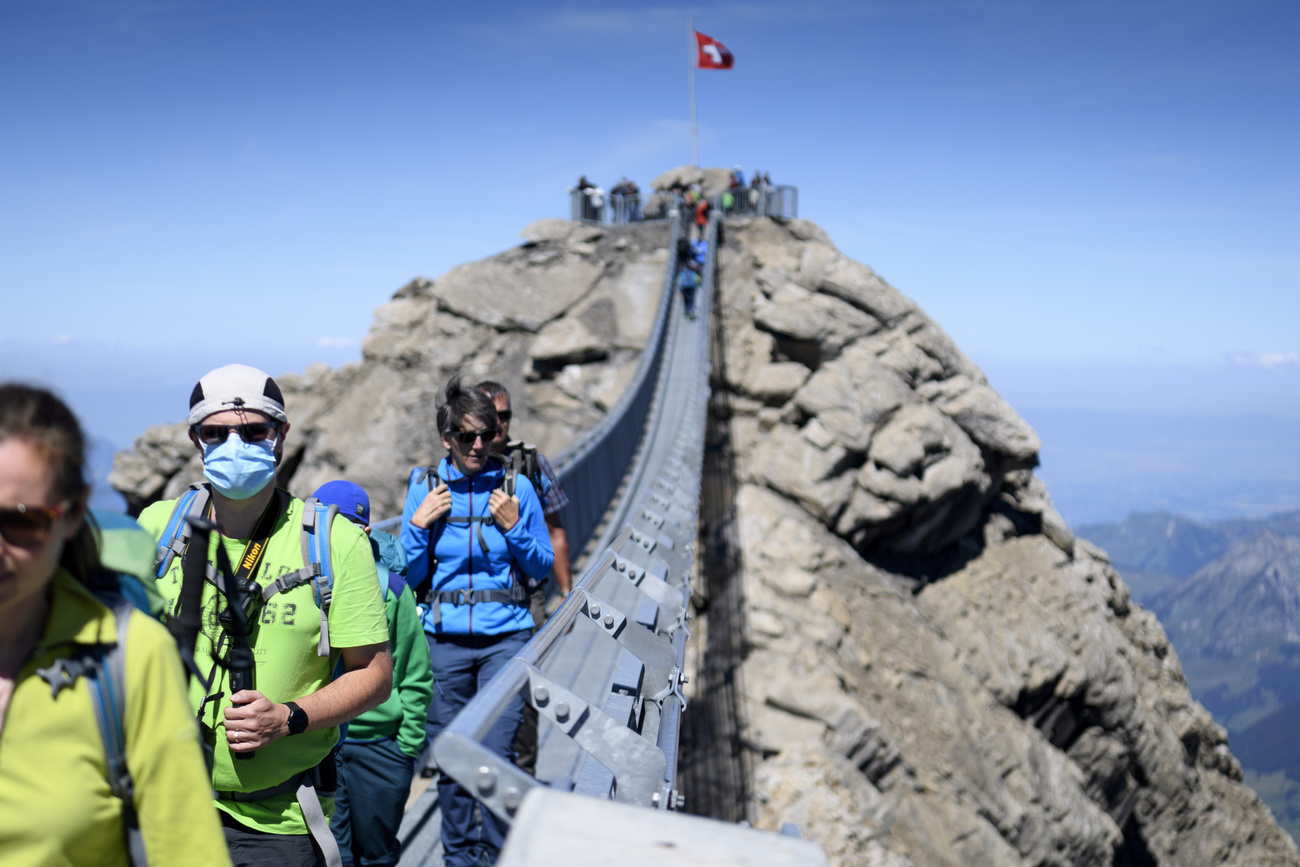
Sustainable tourism may prosper amid coronavirus crisis

The Covid-19 pandemic has had a huge impact on the Swiss tourism industry, as holidaymakers rethink their booking and travel habits. Aurelia Kogler, a professor of tourism, sees the crisis as an opportunity for a more sustainable form of leisure travel to gain favour.
swissinfo.ch: What changes in tourists’ behaviour have you observed?
Aurelia Kogler: The Swiss are now spending their holidays in their own country. That was always a goal of the tourism industry. The restrictions that were imposed as a result of the pandemic seem to have led to this change in demand.
The summer season was saved thanks to Swiss tourists. The summer also turned out better than expected for mountain destinations. But this was not the case for the city travel sector. The crisis has also affected all the tourism service providers that depend on large-scale events for their revenue.
What else have you observed?
The demand for holiday apartments also increased disproportionately this summer. This was probably due partly to the hygiene and distancing rules, and partly to the need to feel safe.
We’ve also seen that the long-haul travel market has completely collapsed. Right now it’s impossible to visit certain countries, either because there is an entry ban, or because there are simply not enough flights. Other regions are accessible, but there is a certain risk involved and several restrictions too. People also ask themselves when they’re choosing a destination whether it’s really worth the trouble.

But the Swiss love to fly…
Yes, the Swiss love traveling abroad. But this has changed completely.
If, despite all the drama, we want to find a silver lining in this situation, we could say that the pandemic has made our modes of travel more sustainable. It remains to be seen if this change in behaviour will continue when the situation goes back to normal. But at the moment the environment is definitely benefiting from a reduction in the number of flights and distances travelled.
Could the crisis be the starting point for a more sustainable form of tourism?
Eco-tourism has been a niche sector for decades. In recent years the issue of sustainability has become more important. The idea has not only been introduced in different legal texts, but also evolved into a type of behaviour that’s appreciated socially. The pandemic has actually led to a questioning, and at least temporarily, to a change in behaviour.
Will this trend continue?
As tourism professionals, we are of course curious to see which aspects of people’s behaviours will become part of our DNA as travellers. We’ll have to see if we’re a bit less negligent in the future about flying off for a weekend here, and a weekend there, just because we can.
We also have to hope that the demand for summer holidays in the mountains will become a long-term trend. When we see the number of families that spent part of their summer in the mountains, we can only hope that they saw for themselves the attractiveness of Alpine destinations and that maybe the children will say, “We want to come back here!”
It’s a big opportunity for Alpine tourism, but we also tend to forget quickly. That said, it’s true that this crisis has been significant. The whole world is more or less terribly affected in nearly every aspect of life. So it could be that certain behaviours will change for good.
What research questions are being now analysed in the tourism sector?
The most urgent question is to figure out what the winter season will be like and what we can do to make it a good one. We are in close contact with those managing the sector and with tourist destinations. The current trend seems to suggest that people are hesitating a bit over bookings for the winter. People are waiting to see what happens. This behaviour is perfectly human and completely understandable.
What other changes have you observed as a result of Covid-19?
One issue that will preoccupy us a lot in the future is the change in workplace behaviours, especially in terms of remote working. On the one hand, this should lead to a change in the office-space real-estate market and have an impact on urban centres. On the other hand, people could also go live and work in more remote rural areas without having to commute.
Coming back to tourism, the question is to find out whether there is an opportunity for tourist destinations and whether new tourism products and solutions can be developed.
If people no longer need to be in a particular place for work purposes, then many might want to move closer to nature and the countryside. So in the mid-to-long term, there is a possibility to strengthen tourist destinations and rural regions that are more structurally weak. But we are just at the beginning.
Do you think the coronavirus crisis will have long-term effects on tourism?
Yes, on the one hand, it will have an effect on companies that operate on a very small equity base. But right now we still don’t know enough about how the economic situation in Europe will evolve and the impact of the pandemic on the unemployment rate in the main tourist markets. A rise in unemployment is one of the main threats to tourism, and not just in Switzerland.

More
Coronavirus: the situation in Switzerland

In compliance with the JTI standards
More: SWI swissinfo.ch certified by the Journalism Trust Initiative





























Join the conversation!